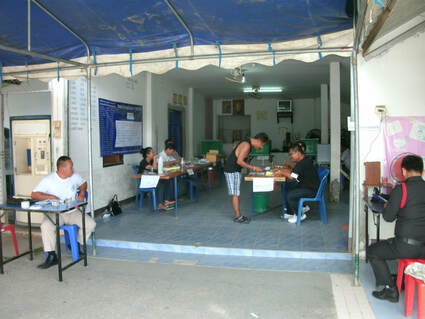|
The first national election in Thailand in 5 years was held on Sunday, March 24 after several delays. The election boils down to two main matters, who will sit in Parliament and who will be the Prime Minister. The members of Parliament will select the Prime Minister who will then form the government and fill government offices.
In fact, the election is mainly a referendum on whether or not the current military-royalist government will retain its ever tightening control over all political processes. This is a devout hope of those with big business interests, royal ties, and industries to run. The opposition is made up of farmers, laborers, small-besieged business owners and academics. First, the election. There were more than 70 political parties with candidates running for Parliament, but only a few of them had a chance to become influential. The two main contenders are Pheu Thai and Palang Pracharat. The Pheu Thai party and its components have won every recent election with convincing enough majorities to form the government without forming an alliance with a minority party. But the military staged a coup and has been running the government for about four years. Under their management the electoral process was changed, with the goal being to make it difficult for the populist Pheu Thai party to get back into power. The current rules stipulate that the lower house of Parliament will have 500 seats, of which 350 will be held by those obtaining majority votes in their districts. A remaining 150 seats will be divided between party candidates on the basis of the percentage of popular vote their parties acquire. They will be selected from party lists (in effect, elected by their party organizations). It appears that Pheu Thai and Palang Pracharat are neck and neck, with Pheu Thai holding a one seat majority. That means that each will have an equal number of the 150 “leveling” seats but the formula to figure out the exact number is complicated. In the end, both of the two biggest parties will need to add support from other parties. The third largest party is also the oldest, the Democratic Party, which was the main opposition party in the years that Pheu Thai and colleagues of Prime Minister Taksin and his sister Prime Minister Yingluck Shinawatra were popular (and fairly autocratic) leaders. It is unlikely that either Pheu Thai or Palang Pracharat will be able to form a government without the Democrats. But a new Bhumjaithai party emerged as almost equal in strength with the Democratic Party. Being anti-military, they are expected to vote with the populist, anti-military Pheu Thai party. The results of voting, objections to how the voting was conducted, and questions raised after the election will be directed to an Electoral Commission, which was appointed by the current government. It remains to be seen exactly how many seats each party will be awarded. The upper house used to be elected as well, but due to changes in the constitution initiated by the current military government, these 250 “senators” are appointed by the government. Meanwhile, they will also vote on who will be the new Prime Minister. That means, presumably, there are already 250 votes for retaining Prime Minister (former Army Chief) Prayut Chan-o-cha. Without reviewing the math, it seems to careful observers that the military party, Palang Pracharat, will only need 126 votes in the lower house. At the moment they have about 118. An alliance with either of the 2 sixth-ranked parties (each with 11 votes) would probably secure Palang Pracharat, the right to name the Prime Minister. The loyalty of the Democratic Party is not yet clear. In principle they are opponents to either a military government or to the populist Pheu Thai party overseen by the Shinawatra family, whom the Democrats fought openly and vigorously. If the military alliance fails to form a majority coalition, given the advantages they have manipulated, their failure will be considered a major and unexpected upset. It would make the way clear for Pheu Thai and its allies to nominate Ms Sudarat Keyuraphan as Prime Minister. The election is over. The vote count is all but wrapped up. Parties are having their discussions, and the Election Commission may have a surprise or two. May 9 is the deadline for getting the new government up and running. Whatever happens, the government will be shaky, made up of a tenuous partnership. The army under new command and fully supported by the palace will be keeping watch “to take over if necessary” to “keep the nation from spiraling into chaos again.”
0 Comments
Leave a Reply. |
AuthorRev. Dr. Kenneth Dobson posts his weekly reflections on this blog. Archives
March 2024
Categories |
| Ken Dobson's Queer Ruminations from Thailand |
|

 RSS Feed
RSS Feed
